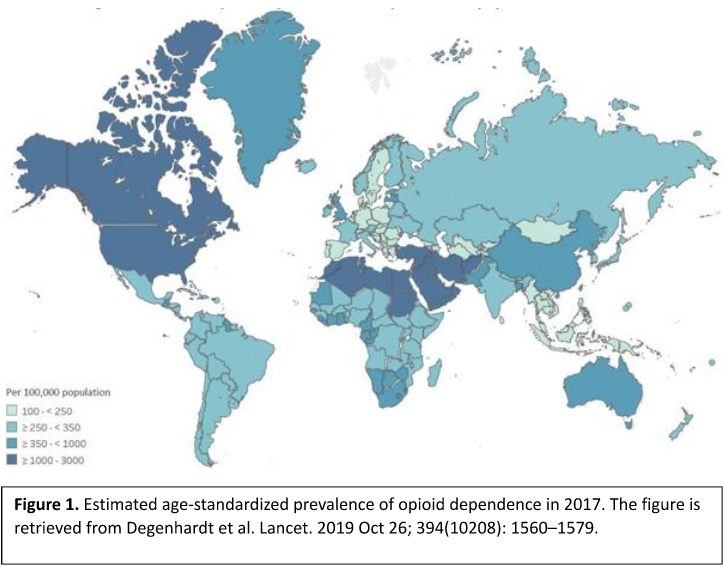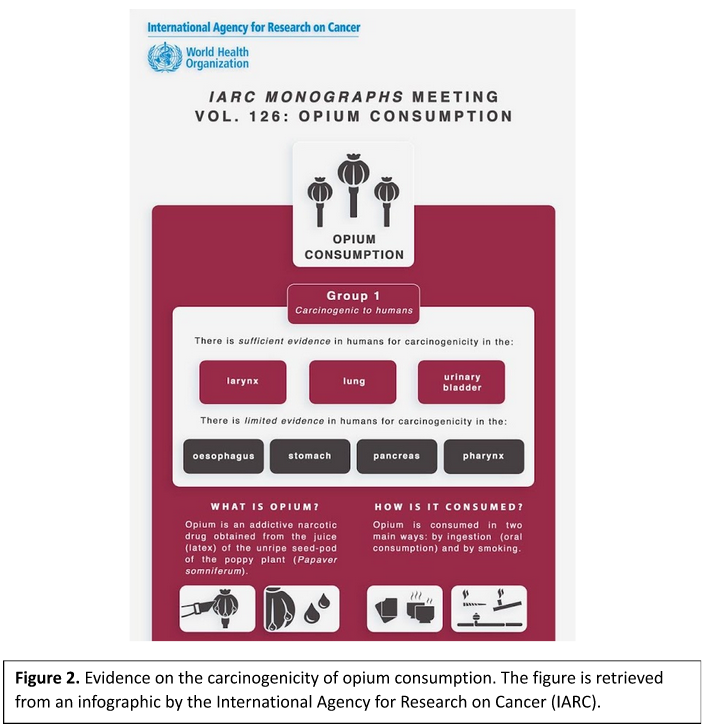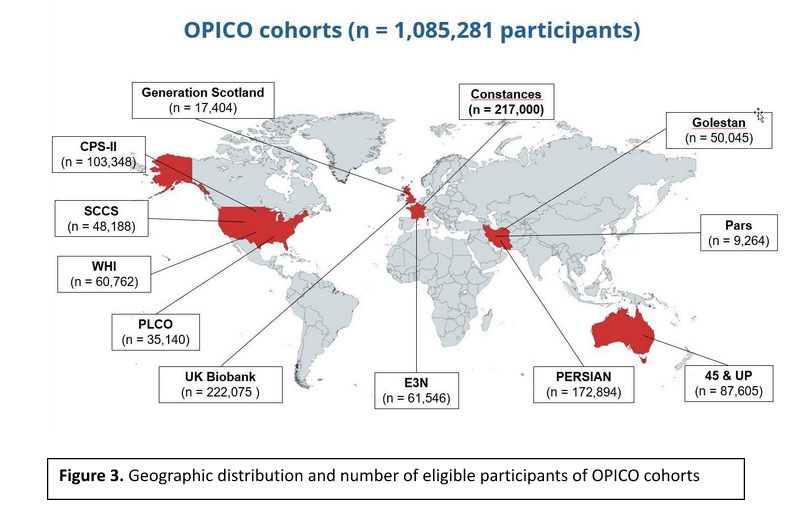IHCC Cohort Spotlight: The Opioid Cohort Consortium (OPICO)

Background
Opioids are a type of pain-relieving medications that have origins and/or effects similar to opium. Although opioids are commonly used for medical purposes, they can be misused for their euphoric effects and addictive properties. Opioid misuse is a global health crisis, with an estimated over 40 million people worldwide experiencing opioid dependence (Figure 1). While the acute health risks of opioid misuse, such as toxicity and overdose death, are well understood, the long-term health effects are unknown.

In 2020, opium consumption was classified as “carcinogenic to humans” by the International Agency for Research on Cancer (IARC) (Figure 2). This classification raises concerns about opioid medications that are derived from opium or synthesized in laboratories to mimic its chemical structure and effects.

In addition to the potential effects on cancer risk, retrospective studies and health record analyses suggest that using opioids may increase the risk of other chronic health conditions, such as cardiovascular diseases. However, it has been impossible to rigorously evaluate the long-term health effects of using opioids due to limited data on opioid use, potential confounding factors (e.g., smoking, alcohol consumption, underlying health conditions), and inadequate statistical power in prospective cohort studies.
To overcome the methodological challenges that have hindered reliable studies in humans, in 2020 we initiated the Opioid Cohort Consortium (OPICO) with pilot funding from the International Hundred K+ Cohort Consortium (IHCC).
Aims and Objectives of OPICO
The overarching aim of OPICO is to build a strong international resource that facilitates multidisciplinary scientific studies on the use of opioids and their long-term health effects. To reach this aim, OPICO has the following objectives:
- Generate detailed data on opioid use, at baseline and during the follow-up period in prospective cohort studies that have linked to medication dispensing / prescription records.
- Harmonize data on opioid use, demographics, related exposures, and potential confounders in large scale prospective cohort studies across different countries.
- Harmonize data on cancer incidence, mortality, and chronic health conditions in prospective cohort studies using various sources such as questionnaires, linked healthcare records, and national registries.
- Investigate the relationship between using opioids and cancer incidence and mortality.
- Establish an infrastructure to pool data / summary statistics from multiple cohorts on the use of opioids and various long-term health outcomes.
Achievements during OPICO pilot phase
Pilot funding from the IHCC enabled us to achieve the following objectives:
- Investigating the availability of opioid use data in different cohorts
- Developing innovative methods for generating and coding opioid exposure at baseline and during the follow-up period in prospective cohorts
- Performing 3 pilot studies and demonstrating the feasibility of defining exposure to opioids using linked medication dispensing records in three different cohorts from the United States, France, and Australia
- Establishing harmonization protocols
- Harmonizing data from several cohorts and performing preliminary analysis on the relationship between different characteristics of opioid use and incident cancers
Status, Perspectives, and Future directions
Currently, 12 prospective cohort studies from North America, Europe, Asia, and Australia have joined / expressed interest to join OPICO (Figure 3). We have secured four-year funding from the French National Cancer Institute (INCa) to support OPICO’s activities beyond the pilot phase, particularly within Europe. We are also applying for additional funding to support future phases of OPICO, specifically within North America and Australia.

This international initiative will create a large-scale data resource with more than one million participants, including over 170,000 individuals who used opioid medications and 30,000 who used opium at baseline, with an average follow-up time of eight years. The innovative exposure assessment methods employed by this consortium will enable the investigation of different aspects of opioid medication use, such as strength, origin, receptor type, bioavailability, and duration of use, as well as opium use in relation to the risk of developing various long-term health outcomes, including cancer, cardiovascular disease, and mortality from different causes.
As several OPICO cohorts have collected biosamples and genetic data from the participants, generating detailed opioid use data in these cohorts will enable undertaking genetic and biomarker studies to triangulate the link between opioids and various long-term health outcomes and to understand the underlying mechanisms related to opioid exposure and its associations with different outcomes.
Contribution to OPICO
Prospective population-based cohort studies that have the following data are eligible to participate in OPICO:
- Data on use of medications: eligible cohorts have either gathered medication use data by questionnaires or have linked the cohort records to their corresponding national medication dispensing records. This would allow us to extract data on using opioids among the cohort participants.
- Dates or equivalent follow-up times: for enrolment, last follow-up time, diagnosis of cancer, death
- Outcomes at follow-up: vital status, cause of death, diagnosis of cancer, type of cancer
- Demographics: Age, Sex, Ethnicity, Any socioeconomic indicators
- Smoking cigarettes: status (never/former/current smoker), and preferably also intensity and duration of smoking
- Alcohol intake: status (never/former/current smoker), and preferably also intensity and duration of alcohol intake
- Chronic health conditions: this would be either collected by questionnaires or would be available through linkage to healthcare records or relevant registries (e.g. diabetes, hypertension, cardiovascular diseases, stroke, chronic inflammatory conditions, rheumatologic disorders, chronic pain, self-reported health status, etc).
Impact of OPICO
An important impact of this project for the scientific community would be the creation of a unique resource to study different aspects of using opioids and its associated health consequences. Such a rich resource with detailed measurement of exposure to opioids and other confounders does not exist.
This project would also have an important impact on the healthcare system. By providing the most robust evidence on the long-term health consequences of using opioid medications, this project would eventually contribute to developing evidence-based clinical guidelines for using opioids in chronic pain management, as well as comprehensive prevention policies to reduce the long-term health-related and economic harms of inappropriate use of opioids.
Contact information of the primary investigator
Mahdi Sheikh, MD, PhD
Scientist, Genomic Epidemiology Branch
International Agency for Research on Cancer (IARC – WHO)
Lyon, France
Email: sheikhm@iarc.who.int








